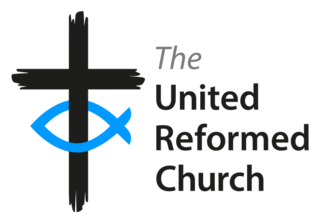Related Research Articles
Congregationalist polity, or congregational polity, often known as congregationalism, is a system of ecclesiastical polity in which every local church (congregation) is independent, ecclesiastically sovereign, or "autonomous". Its first articulation in writing is the Cambridge Platform of 1648 in New England.

The United Reformed Church (URC) is a Protestant Christian church in the United Kingdom. As of 2022 it had approximately 40,000 members in 1,284 congregations with 334 stipendiary ministers.

Congregational churches are Protestant churches in the Reformed (Calvinist) tradition practicing congregational government, in which each congregation independently and autonomously runs its own affairs.

The United Church of Christ (UCC) is a socially liberal mainline Protestant Christian denomination based in the United States, with historical and confessional roots in the Congregational, Restorationist, Continental Reformed, and Lutheran traditions, and with approximately 4,600 churches and 712,000 members.The UCC is a historical continuation of the General Council of Congregational Christian churches founded under the influence of New England Puritanism. Moreover, it also subsumed the third largest Calvinist group in the country, the German Reformed. Notably, its modern members' theological and socio-political stances are often very different from those of its predecessors.
The Church of the United Brethren in Christ is an evangelical Christian denomination with churches in 17 countries. It is Protestant, with an episcopal structure and Arminian theology, with roots in the Mennonite and German Reformed communities of 18th-century Pennsylvania, as well as close ties to Methodism. It was organized in 1800 by Martin Boehm and Philip William Otterbein and is the first American denomination that was not transplanted from Europe. It emerged from United Brethren churches that were at first unorganized, and not all of which joined this church when it was formally organized in 1800, following a 1789 conference at the Otterbein Church.
The Confessing Movement is a largely lay-led theologically conservative Christian movement that opposes the influence of theological liberalism and theological progressivism currently within several mainline Protestant denominations and seeks to return them to its view of orthodox doctrine, or form a new denomination and disfellowship (excommunicate) them if the situation becomes untenable. Those who eventually deem dealing with theological liberalism and theological progressivism within their churches and denominations as not being tenable anymore would later join or start Confessional Churches and/or Evangelical Churches that continue with the traditions of their respective denominations and maintaining orthodox doctrine while being ecclesiastically separate from the Mainline Protestant denominations.
The Congregational Christian Churches were a Protestant Christian denomination that operated in the U.S. from 1931 through 1957. On the latter date, most of its churches joined the Evangelical and Reformed Church in a merger to become the United Church of Christ. Others created the National Association of Congregational Christian Churches or joined the Conservative Congregational Christian Conference that formed earlier in 1945. During the forementioned period, its churches were organized nationally into a General Council, with parallel state conferences, sectional associations, and missionary instrumentalities. Congregations, however, retained their local autonomy and these groups were legally separate from the congregations.
The Evangelical and Reformed Church (E&R) was a Protestant Christian denomination in the United States. It was formed in 1934 by the merger of the Reformed Church in the United States (RCUS) with the Evangelical Synod of North America (ESNA). A minority within the RCUS remained out of the merger in order to continue the name Reformed Church in the United States. In 1957, the Evangelical and Reformed Church merged with the majority of the Congregational Christian Churches (CC) to form the United Church of Christ (UCC).
The Evangelical Synod of North America, before 1927 German Evangelical Synod of North America, in German (Deutsche) Evangelische Synode von Nord-Amerika, was a Protestant Christian denomination in the United States existing from the mid-19th century until its 1934 merger with the Reformed Church in the United States to form the Evangelical and Reformed Church. This church merged with the Congregational Christian Churches in 1957 to create the United Church of Christ.
The National Association of Congregational Christian Churches (NACCC) is an association of about 400 churches providing fellowship for and services to churches from the Congregational tradition. The Association maintains its national office in Oak Creek, Wisconsin, a suburb of Milwaukee. The body was founded in 1955 by former clergy and laypeople of the Congregational Christian Churches in response to that denomination's pending merger with the Evangelical and Reformed Church to form the United Church of Christ in 1957.

The Evangelical Methodist Church (EMC) is a Christian denomination in the Wesleyan-Holiness tradition headquartered in Indianapolis, Indiana. The denomination reported 399 churches in the United States, Mexico, Burma/Myanmar, Canada, Philippines and several European and African nations in 2018, and a total of 34,656 members worldwide.
The Conservative Congregational Christian Conference is a Congregationalist denomination of Protestant Christianity. It is based in the United States.
The Evangelical Church of North America (ECNA) is a Wesleyan-Holiness, Protestant Christian denomination headquartered in Clackamas, Oregon. As of 2000, the Church had 12,475 members in 133 local churches. The Church sponsors missionaries in seven countries.
Biblical Witness Fellowship is an evangelical renewal movement composed of members of the United Church of Christ. Founded in 1978 as the United Church People for Biblical Witness, the movement reorganized as the Biblical Witness Fellowship at a national convocation in Byfield, Massachusetts in 1984, hosted by the current president of BWF, the Rev. Dr. William Boylan.

The Evangelical Association of Reformed and Congregational Christian Churches is a fellowship of conservative evangelical Protestant Christian congregations in the United States that became disaffected from the United Church of Christ due to that denomination's national entities professing support for practices such as abortion and homosexuality. Unlike other more sectarian churches, the Evangelical Association does not forbid its member congregations to simultaneously belong to other denominations and fellowships, as the local churches continue to practice congregational polity.

O'Kelly's Chapel is a historic chapel located near Farrington, Chatham County, North Carolina. Named after Reverend James O'Kelly, it was built about 1900. It is a modest one-room rural chapel with Gothic Revival features including a steeply pitched roof and lancet windows.
The World Evangelical Congregational Fellowship (WECF) is a global association of evangelical Christian Congregational Churches, from various national associations around the world, which is united by a common belief in the lordship of Jesus Christ and the authority of the Bible, as well as by its common desire for evangelism.
The General Synod of the United Church of Christ is the national decision-making body for the denomination, responsible for giving general direction to the evangelistic, missionary, and justice programs of the UCC. Because the UCC holds to an explicitly congregational polity, though, any decisions made by the Synod are not binding upon the UCC's congregations in any way, though the national offices and the UCC's Constitution and Bylaws expect serious consideration to be given them. The Synod is the legal successor the General Council of the Congregational Christian Churches and the General Synod of the Evangelical and Reformed Church. The Synod is responsible for authorizing budgets and electing board members for the "Covenanted Ministries" of the UCC; those agencies have evolved over the years from a number of separate entities, with different organizational structures, into a more coordinated configuration in order to serve the denomination more efficiently. The home and international missions agencies in particular were the descendants of Congregationalist boards founded in the 19th century; they were "recognized" when the UCC began during the period between 1957 and 1961. The Synod usually makes pronouncements and passes resolutions on social and political issues judged to be of concern by delegates as well; most if not all have historically reflected liberal theological and political perspectives, including support for civil rights, feminism, environmentalism, and rights for homosexuals.
The National Council of Congregational Churches of the United States was a mainline Protestant, Christian denomination in the United States. Its organization as a denomination was delayed by the Civil War. Congregational leaders met again in Boston, Massachusetts in 1865, where they began to hammer out standards of church procedures (polity) and adopted a statement of faith, known as the Burial Hill Declaration. Denominational organization came in 1871 with formation of the National Council of Congregational Churches, which existed until its merger in 1931. In 1928, there were 5,497 Congregational churches in the U.S. with a membership of 939,130. These churches were served by 5,648 ministers.
John C. Dorhauer is an American Protestant clergy member, author, and theologian who served as the ninth General Minister and President (GMP) of the United Church of Christ (UCC), a Mainline Protestant denomination, from June 30, 2015, through July 2023.
References
- ↑ "Church Parley Votes Today on Huge Merger". New York Times Company. Sep 3, 1956. ProQuest 843366286.
- ↑ Michigan Conference United Church Of Christ, Church Finder
- 1 2 3 4 Campbell, Marlene (2003). A History of the Michigan Conference United Church of Christ and Its Parent Denominations 1842-1992. ISBN 9780973415001.
- ↑ "UCC ministers train for Fund raising". Tri - State Defender. May 19, 1973. ProQuest 370638256.
- ↑ Rogers, John MacNaughton (2019). Kirk, Michael (ed.). Defining Moments – My Story. Claremont CA: John M. Rogers – Kindle Direct Publishing (KDP). ISBN 978-1-09-169759-1.